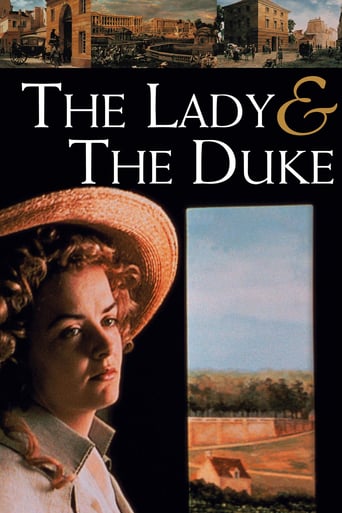MartinHafer
This film from Eric Rohmer is very, very unusual. While it's not unusual to use matte paintings to create effects (such as to paint in buildings in the background to cover up modern skyscrapers for period films), here Rohmer uses another technique--one I have never seen before in a full-length film. The movie makes no attempt to blend in what is real and what isn't. Instead, in many scenes, you have folks walking within giant paintings which appear to have been painted during the 18th century--when the film was to have occurred. It is VERY striking and very unusual--and you can't help but notice it.The story is an essentially true story about a woman named Grace Elliott--a very, very interesting lady. She was the mistress of the future King George IV of Britain and after giving birth to an illegitimate child, she left to live in France. There she became the mistress of the King of France's cousin, the Duke of Orleans. However, the timing for all this was very poor. That's because a few years later, the French Revolution arrived--and her now ex-lover, the Duke, begs her to leave the country. She insists she's safe and time passes. And, as time passes, the country becomes more paranoid and more self-destructive--killing off aristocrats and foreigners in the wake of a now insane revolution.At this point in time, the Duke and Elliott have changed. Now, the liberal-minded Duke has embraced the Revolution and is an official in its new government. She, on the other hand, is a die-hard royalist who really should keep her opinions to herself. Yet, despite their different paths, they remained friends--though there was a lot of tension between them, as the Duke eventually consented to the execution of the King--something Elliott had a hard time forgiving. What's next for this unusual lady? See for yourself in this excellent film.The film was based in part on the autobiography of Elliott--which was published after her death. Earlier I said the story is ESSENTIALLY true because I did some reading and found that she had a tendency to sometimes 'embellish' the facts, though what's in the film is what occurred. Overall, a fascinating look into the insanity of the French Revolution and at a particularly unusual woman. Well worth seeing.
Andres Salama
Rohmer returns to his historical dramas in the real story of Grace Elliot, an Englishwoman who stayed in France during the apex of the French Revolution. One always suspected that Rohmer was a conservative, but who knew he was such a red-blooded reactionary. If you can put aside Rohmer's unabashed defense of the monarchy (and that is not an easy thing to do, given that, for instance, the French lower classes are portrayed here as hideous louts), this is actually an elegant, intelligent and polished movie. Lacking the money for a big cinematic recreation of 18th century France, Rohmer has instead the actors play against obvious painted cardboards. It is a blatantly artificial conceit, but it somehow works. And newcomer Lucy Russell succeeds in making sympathetic a character that shouldn't be.
mintonmedia
I can hardly believe that this inert, turgid and badly staged film is by a filmmaker whose other works I've quite enjoyed. The experience of enduring THE LADY AND THE DUKE (and no other word but "enduring" will do), left me in a vile mood, a condition relieved only by reading the IMDb user comment by ali-112. For not only has Rohmer attempted (with success) to make us see the world through the genre art of 18th century France but, as ali has pointed out, has shown (at the cost of alienating his audience) the effects of both class consciousness and the revolution it inspired through the eyes of a dislikably elitist woman of her times. The director has accomplished something undeniably difficult, but I question whether it was worth the effort it took for him to do so -- or for us to watch the dull results of his labor.
fiozinho
As interesting as a sheet of cardboard, this dispensable period piece has little going for it. It's overly wordy and fails spectacularly to evoke the tension and fear that the real-life characters must have felt as they dodged the French Revolution's fickle hand of justice. Eric Rohmer at 82? It shows.


